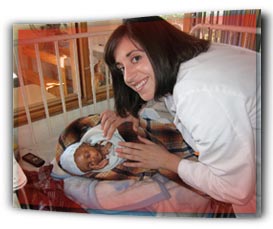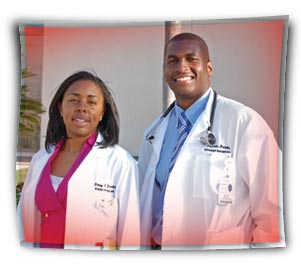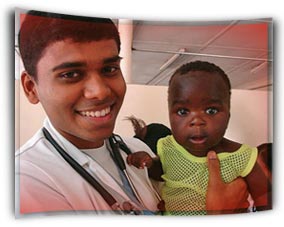To determine whether an Adventist school is accomplishing its mission of offering quality education, highlighting a spiritual emphasis, and positively changing lives, whom better to ask than its students? Features editor Sandra Blackmer talked with three LLU School of Medicine students—who are also being interviewed by the Adventist Church’s Hope Channel* for an upcoming program—and asked them, “What do you think about your school?” Here’s what they said:
Lindsay Bautista
 s her 2010 graduation from Loma Linda University School of Medicine approaches, Lindsay Bautista reflects on the reasons that initially brought her to this particular medical school.
s her 2010 graduation from Loma Linda University School of Medicine approaches, Lindsay Bautista reflects on the reasons that initially brought her to this particular medical school.“I knew some doctors who had been educated here, and I respected them and their praise of the school,” she says. “I also knew that statistically the school prepares their students well for board examinations required for licensure.”
Although Bautista says she would not have elected to attend a medical school that didn’t provide high quality academics, what most strongly attracted her to LLUSM was the emotional and spiritual support she expected to find there.
“I knew the faculty cared about the well-being of the students and would do everything they could to help us through the long and grueling journey that is medical school.”
Her classmates “build each other up” and don’t have “a competitive mind-set,” Bautista says, then adds, “I feel we have formed bonds that will last a lifetime.”
Bautista describes medical school as “harder than [she] ever imagined it would be,” yet the spiritual focus of the program isn’t lost amid the hustle and bustle of hectic schedules. Rather, she says, the program motivates her to “tend to my own spiritual life and make sure it isn’t tossed by the wayside.”
“I’ve learned a lot about myself in the last four years,” Bautista concedes. “I’ve learned that sometimes my best isn’t good enough—and that’s where God comes in. I’m learning to trust that God will insert His strength for my weakness.”
 The importance of keeping a healthful balance in one’s life is something Bautista also has discovered. “Sometimes you need to give yourself a break and be forgiving of your shortcomings,” she says. “Trying your best doesn’t mean studying 24 hours a day; sometimes it means taking a break and laughing with friends so you can find the strength to keep learning again the next day.”
The importance of keeping a healthful balance in one’s life is something Bautista also has discovered. “Sometimes you need to give yourself a break and be forgiving of your shortcomings,” she says. “Trying your best doesn’t mean studying 24 hours a day; sometimes it means taking a break and laughing with friends so you can find the strength to keep learning again the next day.”
During her first two years at LLUSM, Bautista was involved with an outreach program called Project HOPE, dedicated to mentoring and providing health and parenting education to pregnant teenagers enrolled in San Bernardino high schools. She was assigned a young woman named Maria, and she talked to her every week about her pregnancy, later her newborn child, and about her hopes and dreams for the future.
“A lot of the girls in the program didn’t dare to have goals for themselves,” Bautista says. “Our mission as mentors was to encourage them and let them know they were worth our time and worthy of believing in their abilities. Many of these girls were looked down upon, and no one, save their teachers and us, ever told them they were valuable.”
As second-year medical students, Bautista and her classmates decided to “adopt” a hospital in need of “a voice” and resources. They chose Hôpital Adventiste d’Haiti in Port-au-Prince, Haiti, and embarked on a mission to [raise funds] to give to the hospital as an endowment fund.
“Our class hopes to continue to support the hospital by encouraging each other to spend time working there once we complete residency,” Bautista says.
Three years of Pediatric residency await Bautista following graduation, after which she wants to devote some time to medical service overseas.
Although Bautista’s educational journey hasn’t been easy, and she describes encounters with patients as sometimes being “very painful and draining,” she says, “When a child smiles at me or a patient looks me in the eye and thanks me, it’s all worth it.”
Jaysson Brooks
 ts emphasis on “producing missionary doctors” is the main reason Jaysson Brooks chose to attend LLUSM. “No other medical school offers such a clear-cut pathway to becoming a missionary doctor,” he says.
ts emphasis on “producing missionary doctors” is the main reason Jaysson Brooks chose to attend LLUSM. “No other medical school offers such a clear-cut pathway to becoming a missionary doctor,” he says.
Originally from Upper Marlboro, Maryland, Brooks got a taste for mission service when he was a student at Oakwood University in Huntsville, Alabama. While there, he was part of a school-sponsored program called NAPS—National Association for the Prevention of Starvation—and was involved in missionary endeavors both at home and abroad.
 “Being part of NAPS and helping to baptize thousands of people across the world helped me form a real relationship with Christ,” he explains. “When I heard that LLUSM has a missionary program run jointly with the General Conference where I could get my medical school loans paid off while I did missionary work overseas (after I had completed my training), I knew that LLUSM was the program for me.”
“Being part of NAPS and helping to baptize thousands of people across the world helped me form a real relationship with Christ,” he explains. “When I heard that LLUSM has a missionary program run jointly with the General Conference where I could get my medical school loans paid off while I did missionary work overseas (after I had completed my training), I knew that LLUSM was the program for me.”
Brooks sees the spiritual focus of the school as another of its strengths. He says that although other medical schools “have ethics classes or compassion-in-medicine classes where they beat around the bush about how to address other aspects of patient care besides just the physical, at LLUSM we’re free to come right out and say that we’re treating not only the physical but the spiritual, as well—and we’re proud of it!” He adds that teachers praying with him and his being able to talk about God freely with classmates are also encouraging aspects of his experience there.
Brooks is involved in local outreach to children. Holding children’s programs in troubled communities, Brooks says, “recharges” him. “We teach the children about God and how He applies to their everyday lives,” he says. “We try to show them that there’s more out there that they can do and become than what they see in their communities.”
During his first year of medical school, Brooks also learned some of the realities of overseas medical missionary work when he went to Zambia, Africa, to serve in Mwami Adventist Hospital. “I really enjoyed it,” he says.
Following graduation in 2011, Brooks plans to do five years of residency in orthopedic surgery. His wife, Brittany, also a medical student at the school, is interested in obstetrics and gynecology.
If asked to advise other young adults choosing a medical school, Brooks says they should “consider what will make them happy in the end—gloating about big-name [secular schools], or being in a Christian, nurturing environment that trains students how to treat both the body and the soul.
“If you like combining God and medicine, there is no other school like that out there.”
Sylvester Paulisir
 pirituality should never be separated from medicine. Our patients need spiritual care,” says Sylvester Paulisir, class of 2012.
pirituality should never be separated from medicine. Our patients need spiritual care,” says Sylvester Paulisir, class of 2012.
 LLUSM’s philosophy of caring for the whole person, its Christian perspective, and its focus on mission are the reasons Paulisir selected this school. He says that LLUSM “not only trains physicians to be competent in their clinical and academic skills but has a huge emphasis on exercising Christian compassion and catering to the spiritual well-being of the patients.” He also cites the ongoing “commendable performances” of its students in national board exams.
LLUSM’s philosophy of caring for the whole person, its Christian perspective, and its focus on mission are the reasons Paulisir selected this school. He says that LLUSM “not only trains physicians to be competent in their clinical and academic skills but has a huge emphasis on exercising Christian compassion and catering to the spiritual well-being of the patients.” He also cites the ongoing “commendable performances” of its students in national board exams.
Paulisir says the medical center physicians inspire him. “Well-experienced attending physicians taking the time to explain simple concepts” to the students, as well as their “humility and patience,” are qualities Paulisir hopes to emulate in his future practice.
He adds, “The spiritual component of our education pushes us to think of our patients not just as medical cases but as whole persons, which puts a whole different spin on the way we as future physicians will practice medicine.”
Paulisir did a mission stint last summer at Kendu Adventist Hospital in Kenya, which he said is helping him to decide the area of medicine he would like to focus on. It also provided “some hands-on experience in performing fascinating medical procedures.”
“LLUSM is not only teaching me about the different diseases and how to treat them, but has instilled in me the thought that true healing comes only from Christ, and that we are mere instruments in His hands.”
________
_________
Sandra Blackmer is features editor for the Adventist Review. This article was published April 22, 2010.

 The importance of keeping a healthful balance in one’s life is something Bautista also has discovered. “Sometimes you need to give yourself a break and be forgiving of your shortcomings,” she says. “Trying your best doesn’t mean studying 24 hours a day; sometimes it means taking a break and laughing with friends so you can find the strength to keep learning again the next day.”
The importance of keeping a healthful balance in one’s life is something Bautista also has discovered. “Sometimes you need to give yourself a break and be forgiving of your shortcomings,” she says. “Trying your best doesn’t mean studying 24 hours a day; sometimes it means taking a break and laughing with friends so you can find the strength to keep learning again the next day.” “Being part of NAPS and helping to baptize thousands of people across the world helped me form a real relationship with Christ,” he explains. “When I heard that LLUSM has a missionary program run jointly with the General Conference where I could get my medical school loans paid off while I did missionary work overseas (after I had completed my training), I knew that LLUSM was the program for me.”
“Being part of NAPS and helping to baptize thousands of people across the world helped me form a real relationship with Christ,” he explains. “When I heard that LLUSM has a missionary program run jointly with the General Conference where I could get my medical school loans paid off while I did missionary work overseas (after I had completed my training), I knew that LLUSM was the program for me.” LLUSM’s philosophy of caring for the whole person, its Christian perspective, and its focus on mission are the reasons Paulisir selected this school. He says that LLUSM “not only trains physicians to be competent in their clinical and academic skills but has a huge emphasis on exercising Christian compassion and catering to the spiritual well-being of the patients.” He also cites the ongoing “commendable performances” of its students in national board exams.
LLUSM’s philosophy of caring for the whole person, its Christian perspective, and its focus on mission are the reasons Paulisir selected this school. He says that LLUSM “not only trains physicians to be competent in their clinical and academic skills but has a huge emphasis on exercising Christian compassion and catering to the spiritual well-being of the patients.” He also cites the ongoing “commendable performances” of its students in national board exams.